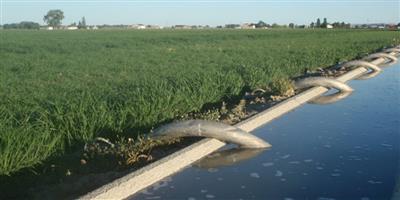Western Confluence reports:
Ranchers today in the Upper Green River Basin say they are modern-day beavers. Typically, tributaries to the Green River, fed by mountain snow melt, surge in May and June and dwindle to nearly nothing in late summer and fall. However, as ranchers divert water out of these streams to flood fields and irrigate native hay for winter livestock fodder, the water seeps into the soil and makes its way slowly back to the streams later in the summer. That process, slowing the water as it moves downstream, mimics how beaver dams, once abundant in the area, trap water and let it seep out through the summer.
Although ranchers have long believed that flooding fields benefits wildlife through increases in late season flow, nobody had proved it. In fall of 2013, University of Wyoming Agricultural and Applied Economics master’s student Spencer Blevins set out to do just that. Blevins’ goal was to take a first step toward placing a dollar value on the non-agricultural benefits of flood irrigation. How much are those benefits worth to people who enjoy hunting, fishing, and birding?
Members of UW faculty involved in the Upper Green River Basin Conservation Exchange, an ongoing effort to establish a market for private investment in ecosystem services, guided Blevins’ work. The exchange will pay ranchers for the ecosystem services the ranches provide. Blevins’ study was designed to determine whether the non-agricultural benefits of flood irrigation were significant enough that a conservation investor might be willing to pay for them.
Several factors could change irrigation practices in the Upper Green River Basin, with potential repercussions for stream flows throughout the summer. Some ranchers face economic incentives to subdivide their land for residential development, in which case irrigation stops altogether. Alternatively, if hay prices go up, ranchers could face economic pressure to adopt more efficient irrigation technology such as center-pivot
There is a great deal to be learned from this study. Blevins was able to show that the non-agricultural benefits of flood irrigating are potentially quite significant and comparable in magnitude to revenues from alternative land uses. If managers or conservation groups find a way to compensate private landowners for the full benefits their flood irrigation provides, it could affect their future land use decisions. “Wasteful” flood irrigation is not so wasteful after all, at least in a mountain valley with alluvial soils such as the New Fork, and in fact helps everyone from ranchers to trout to fishing guides, in unexpected ways.
CLICK HERE to read more
Source: The Montana Conservationist
UW Extension photo


